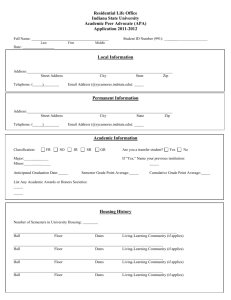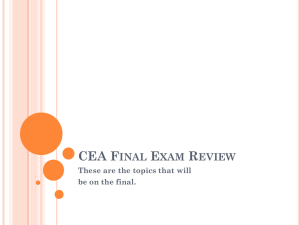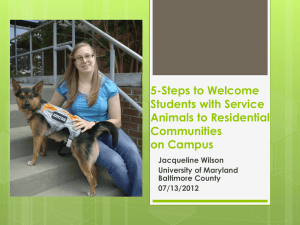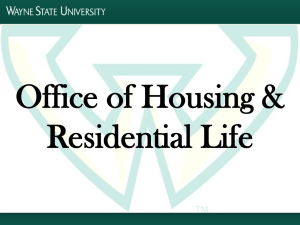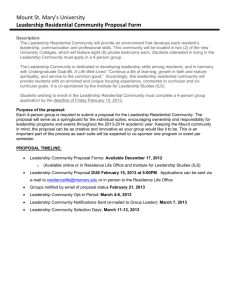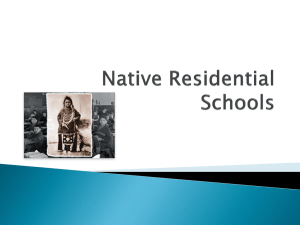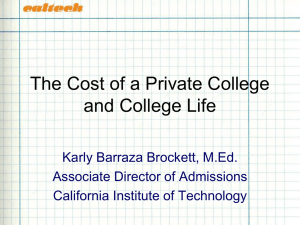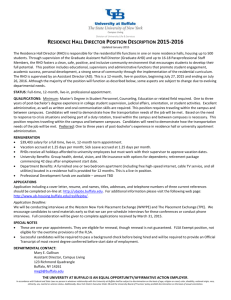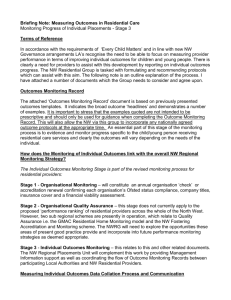Assistant Director for Res Ed Description (WORD)
advertisement
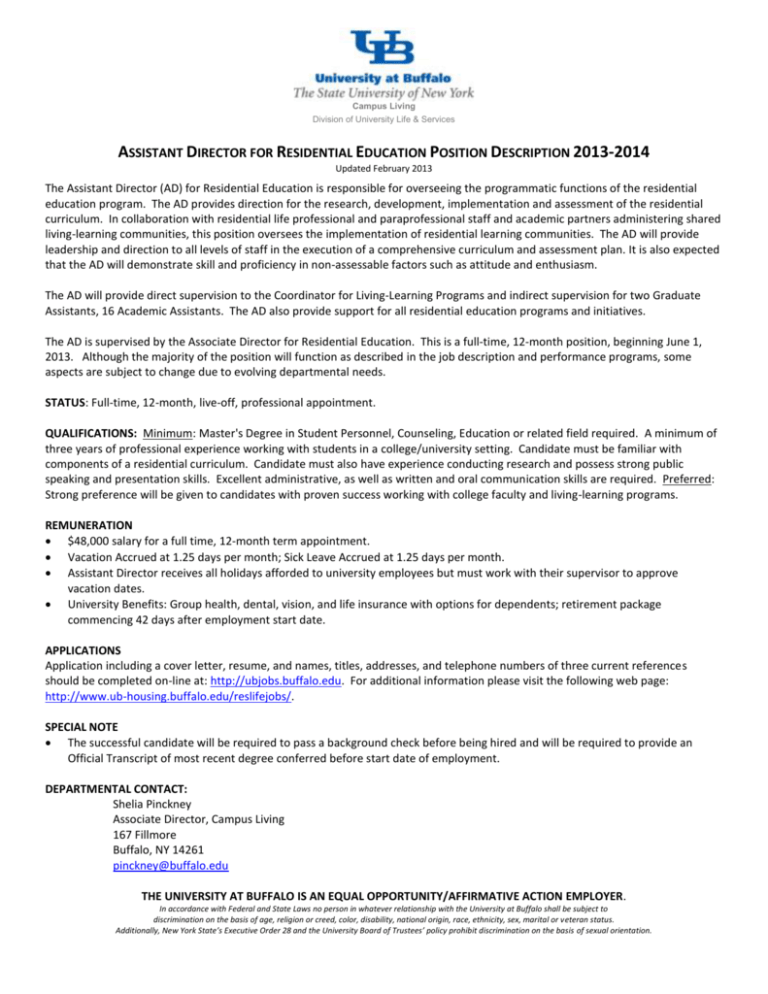
Campus Living Division of University Life & Services ASSISTANT DIRECTOR FOR RESIDENTIAL EDUCATION POSITION DESCRIPTION 2013-2014 Updated February 2013 The Assistant Director (AD) for Residential Education is responsible for overseeing the programmatic functions of the residential education program. The AD provides direction for the research, development, implementation and assessment of the residential curriculum. In collaboration with residential life professional and paraprofessional staff and academic partners administering shared living-learning communities, this position oversees the implementation of residential learning communities. The AD will provide leadership and direction to all levels of staff in the execution of a comprehensive curriculum and assessment plan. It is also expected that the AD will demonstrate skill and proficiency in non-assessable factors such as attitude and enthusiasm. The AD will provide direct supervision to the Coordinator for Living-Learning Programs and indirect supervision for two Graduate Assistants, 16 Academic Assistants. The AD also provide support for all residential education programs and initiatives. The AD is supervised by the Associate Director for Residential Education. This is a full-time, 12-month position, beginning June 1, 2013. Although the majority of the position will function as described in the job description and performance programs, some aspects are subject to change due to evolving departmental needs. STATUS: Full-time, 12-month, live-off, professional appointment. QUALIFICATIONS: Minimum: Master's Degree in Student Personnel, Counseling, Education or related field required. A minimum of three years of professional experience working with students in a college/university setting. Candidate must be familiar with components of a residential curriculum. Candidate must also have experience conducting research and possess strong public speaking and presentation skills. Excellent administrative, as well as written and oral communication skills are required. Preferred: Strong preference will be given to candidates with proven success working with college faculty and living-learning programs. REMUNERATION $48,000 salary for a full time, 12-month term appointment. Vacation Accrued at 1.25 days per month; Sick Leave Accrued at 1.25 days per month. Assistant Director receives all holidays afforded to university employees but must work with their supervisor to approve vacation dates. University Benefits: Group health, dental, vision, and life insurance with options for dependents; retirement package commencing 42 days after employment start date. APPLICATIONS Application including a cover letter, resume, and names, titles, addresses, and telephone numbers of three current references should be completed on-line at: http://ubjobs.buffalo.edu. For additional information please visit the following web page: http://www.ub-housing.buffalo.edu/reslifejobs/. SPECIAL NOTE The successful candidate will be required to pass a background check before being hired and will be required to provide an Official Transcript of most recent degree conferred before start date of employment. DEPARTMENTAL CONTACT: Shelia Pinckney Associate Director, Campus Living 167 Fillmore Buffalo, NY 14261 pinckney@buffalo.edu THE UNIVERSITY AT BUFFALO IS AN EQUAL OPPORTUNITY/AFFIRMATIVE ACTION EMPLOYER. In accordance with Federal and State Laws no person in whatever relationship with the University at Buffalo shall be subject to discrimination on the basis of age, religion or creed, color, disability, national origin, race, ethnicity, sex, marital or veteran status. Additionally, New York State’s Executive Order 28 and the University Board of Trustees’ policy prohibit discrimination on the basis of sexual orientation. RESPONSIBILITIES INCLUDE: Residential Curriculum Development • In consultation with residential life leadership team, direct the implementation of educational priorities and learning outcomes that guide program and policy development for the residential life staff. • Coordinate the further development of the residential curriculum by identifying and establishing educational strategies to help achieve outlined goals through the process of writing lesson plans. • Serve as lead in developing programmatic functions for students “by year” in implementation. • Train paraprofessional staff about issues specific to their population (first year, sophomore, etc.) • Chair the Residential Education Committee in the development and implementation of the residential curriculum as well as other academic support initiatives. • Participate in and/or serve as chair of other committees as appropriate. • Develop tools for measuring the effectiveness of educational strategies outlined in the curriculum. • Review and report on assessment data of curriculum and living-learning community programs. • Participate in professional development activities to further the residential curriculum. • Conduct research examining best practices from other institutions in order to improve the residential curriculum. Staff Supervision and Training • Recruit, select, train, and directly supervise Coordinator for Living-Learning Programs. • Recruit, select, train, and indirectly supervise three Graduate Assistants and 16 Academic Assistants. • Serve as a member of the residential life leadership team in providing direction and support to professional and paraprofessional staff. • Participate in the selection of Paraprofessional Staff and Student Assistants. • Assist to provide direction and leadership to the Office Manager and student assistants and student workers. • Provide on-call senior staff support in crises and after-hours business needs to live-in professional staff, on a rotating basis. Learning Community Programs • Provide direction to Coordinator for Living-Learning Programs, Graduate Assistants, and Academic Assistants to execute a comprehensive program of living-learning communities. • Serve as a resource to academic partners in developing and maintaining living-learning communities administered by academic programs and departments. • Identify opportunities for shared programming for students and training for staff in enhancing services offered to livinglearning community students. • Facilitate ongoing communication between academic partners and Campus Living staff. • Participate during university enrollment periods and special events (open houses, discovery days) to highlight the residential living-learning opportunities. Crisis Intervention • Participate in rotating “on-call” system for Campus Living residence halls and apartments, responding to emergencies on weekends. • Use departmental protocol to respond to crisis or emergency situations which includes providing guidance to paraprofessional staff and students. • Provide appropriate post-crisis referrals and follow-up with students and staff. Counseling/Helping/Conflict Management • Serve as a resource and referral agent for students and staff. • Advise and counsel students in crisis within the residence hall. • Diffuse staff and/or student conflicts as appropriate. PROFESSIONAL STANDARDS AND PROFICIENCIES In evaluating the performance of a Living Learning Programs Coordinator, success will be measured by how well the staff member performs the job responsibilities and fulfills the following competencies. • Job Knowledge/Potential - Possesses the competence, knowledge and experience to perform the job effectively and efficiently. Applies technical and procedural knowledge to get the job done. Continuously expands job knowledge and keeps abreast of new developments and displays innovation. • Interpersonal Relations/Skills - Is cooperative, considerate and tactful in dealing with customers, co-workers and the public. Gains confidence and trust of others and exhibits appropriate sensitivity to others. Works effectively with others on a team. • Reliably and Commitment- Consistently meets deadlines and is able to juggle competing priorities without sacrificing quality/accuracy. Demonstrates commitment to the unit and University goals and can be trusted to follow through on commitments. • Communication - Clearly and convincingly expresses thoughts, ideas or facts orally and in writing. Responds appropriately to both written and oral directives and ensures clear, timely communications to others. Builds effective formal and informal communication channels. • Judgment & Accountability - Uses good judgment and follows up as needed. Anticipates and identifies problems and helps to bring about resolutions. Is open to or offers different solutions and determines what to handle independently and what to refer. Is accountable and takes responsibility for own decisions and actions. • Customer Service - Provides quality service to customers and seeks feedback from internal and external customers. Anticipates customer needs and continuously searches for ways to increase customer satisfaction. • Management/Supervision - Visualizes, creates, communicates and sustains a positive environment. Delegates appropriately and promotes teamwork and cooperation. Effectively motivates, coaches, develops and evaluates staff. Special Events and Commitments It is important to recognize that the demands of residence life are different from other jobs. The following events/time periods are mandatory and offer less time flexibility than usual weeks: Late July/August Professional Staff Training— six weeks (TBD) Paraprofessional Staff Training— one and a half weeks including night/weekend responsibilities Open House Days—one Saturday each semester RHA Leadership Conference – one Saturday in the Fall Paraprofessional Staff Selection—two weekend days each semester (Fall Semester if Needed) January Professional and Paraprofessional Staff Training—full time, one week including weekend responsibilities Evaluation The Assistant Director is evaluated on a semester basis or as needed by the Associate Director for Residential Education. Evaluations are based on first-hand knowledge, feedback from peers, supervisees including committee members. A formal written, departmental evaluation is done once a year. AREA DESCRIPTIONS The University at Buffalo houses approximately 5,750 students in facilities located on both the North and the South Campus. Listed below are descriptions of the four residence hall areas: The Joseph Ellicott Complex, located on the North Campus, is a self-contained living area housing more than 3,000 students. Ellicott is divided into six quadrangles (residence halls)--Fargo, Porter, Red Jacket, Richmond, Spaulding, and Wilkeson. Living areas are coeducational by alternating sections. Several special-interest areas are located within Ellicott. All of Wilkeson, Spaulding, and Richmond house first-year students. Spaulding and Wilkeson house First Year Interest (FYI) floors that have an Academic Assistant on the floor. In these buildings the Residence Hall Director co-supervises the Academic Assistants. Governors Complex, located on the North Camus, is a complex of 4 halls in semi-suites, each consisting of four double rooms, a bathroom, and a small lounge. Each hall houses 200 students and 6 Resident Advisors. AHDs in this area oversee one small hall with the support of a full-time Complex Coordinator. Some tasks (advising hall council, coordinating duty schedules, opening/closing are shared with other staff. Governors house several first year learning communities – the Acker Scholars, the Honors College, Leadership House, and the Undergraduate Academies. The Acker Scholars and Undergraduate Academies have Academic Assistants. William R. Greiner Hall is located next to the Ellicott Complex on North Campus. Greiner Hall houses 600 students and is the only facility that serves a sophomore-only population. The building offers suite-style living with two double rooms with an adjoining private bathroom and storage area. Kitchens, laundry rooms and lounges on every floor as well as many study spaces in large lounges and intimate seating areas throughout, as well as a multipurpose space for workshops and social gatherings, are all available to students. There are five Shared Interest Housing (SIH) learning communities in Greiner: Acker Scholars, the Honors, MORE House, UB Scholars and the Undergraduate Academies. South Campus has two residence hall facilities: Clement and Goodyear. The South Campus is located at the northern edge of Buffalo, bordering the suburb of Amherst and houses just fewer than 1,000 students. All of Goodyear houses first-year students. The Architecture FYI learning community is housed in Goodyear and the Architecture SIH is housed in Clement. In these buildings the Residence Hall Director co-supervises the Academic Assistants. Many new students are assigned to the South Campus.
